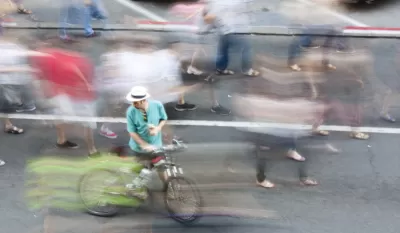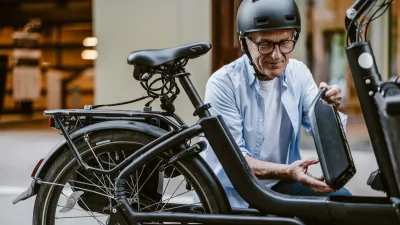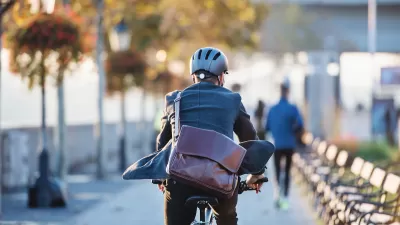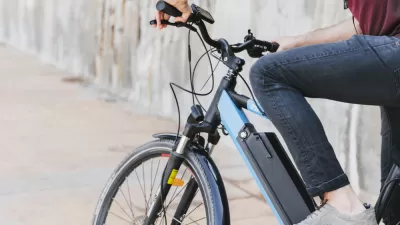Allowing bikes on sidewalks pits cyclists against pedestrians, an advocate argues.

In the world of active transportation, "bike and pedestrian" is often uttered in one breath—as in "bike/ped," "ped/bike," "bike+ped," etc.
But for Douglas MacDonald, former Secretary of Transportation for the state of Washington, the two are not natural allies. Rather, in places without strong infrastructure for both—where neither walkers or cyclists can safely traverse car-dominated roads—they become adversaries competing for space on the sidewalk.
In Crosscut, MacDonald outlines how he sees this dynamic playing out in Seattle, where new state legislation allows e-bikes as well as regular bikes to be ridden on sidewalks. He argues that allowing any type of bike on the sidewalk is "a throwback to an earlier time," when cyclists were fewer and sidewalks were not recognized as "special refuge for the elderly or disabled." Not only do bikes in motion endanger pedestrians, he writes, but with the introduction of dockless bikeshare to the city, parked bikes are obstructing walking paths or encroaching on lawns.
On Planetizen, Ariel Godwin and Anne M. Price have dissected the implications of cycling on sidewalks, while Michael Lewyn has argued that pedestrians and cyclists should band together to fight for infrastructure that benefits both.
FULL STORY: E-bikers, these sidewalks are made for walking

Planetizen Federal Action Tracker
A weekly monitor of how Trump’s orders and actions are impacting planners and planning in America.

Maui's Vacation Rental Debate Turns Ugly
Verbal attacks, misinformation campaigns and fistfights plague a high-stakes debate to convert thousands of vacation rentals into long-term housing.

Restaurant Patios Were a Pandemic Win — Why Were They so Hard to Keep?
Social distancing requirements and changes in travel patterns prompted cities to pilot new uses for street and sidewalk space. Then it got complicated.

In California Battle of Housing vs. Environment, Housing Just Won
A new state law significantly limits the power of CEQA, an environmental review law that served as a powerful tool for blocking new development.

Boulder Eliminates Parking Minimums Citywide
Officials estimate the cost of building a single underground parking space at up to $100,000.

Orange County, Florida Adopts Largest US “Sprawl Repair” Code
The ‘Orange Code’ seeks to rectify decades of sprawl-inducing, car-oriented development.
Urban Design for Planners 1: Software Tools
This six-course series explores essential urban design concepts using open source software and equips planners with the tools they need to participate fully in the urban design process.
Planning for Universal Design
Learn the tools for implementing Universal Design in planning regulations.
Heyer Gruel & Associates PA
JM Goldson LLC
Custer County Colorado
City of Camden Redevelopment Agency
City of Astoria
Transportation Research & Education Center (TREC) at Portland State University
Jefferson Parish Government
Camden Redevelopment Agency
City of Claremont





























